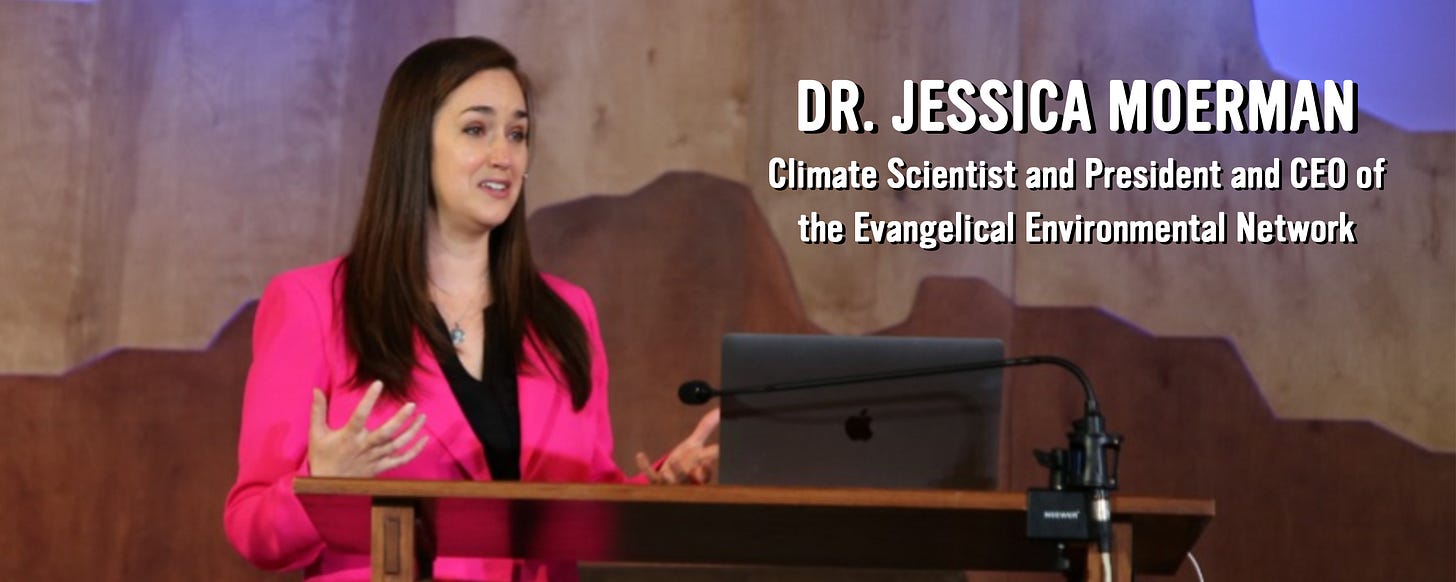Air pollution, heatwaves and wildfires: Jessica Moerman offers a faith-based response to the climate crisis
Guest edition with climate scientist Jessica Moerman
The other week, a wildfire burned through the historic town of Lahaina with devastating speed as residents fled to the ocean for safety. To date, it’s responsible for the deaths of over 110 people, making it the most deadly wildfire in the U.S. in over a century. More recently, cities and towns across the Yukon and British Columbia were being evacuated, as well as thousands more in the Canary Islands.
What's happening in these places reminds us that climate action isn’t about saving the planet: it’s about saving lives. And no one understands this better than paleoclimatologist Jessica Moerman, this week’s guest editor.
Jessica’s science credentials are impeccable: she has a Ph.D. in Earth and Atmospheric Sciences from Georgia Tech and she’s been a researcher at John Hopkins University, the University of Michigan, and one of my favourite places, the Smithsonian National Museum of Natural History. Today, however, she’s at the forefront of integrating climate action with faith, serving as president and CEO of the Evangelical Environmental Network (EEN).
This might seem like a big career switch; but, like me, Jessica became a climate scientist because of her faith. She’s acutely aware that the most vulnerable bear the brunt of climate impacts — “the very ones Jesus calls his followers to love, serve, and give special care to.” It’s with this conviction that she now leads an organization that focuses on protecting God’s creation and defending people's life and health from climate and environmental harm.
At EEN, Jessica and her team work to educate and mobilize Christians to rekindle the Biblical mandate to care for creation and work toward a safe climate and a healthy, pollution-free world. Last December, for example, she testified before the U.S. Congress at the final hearing of the House Select Committee for the Climate Crisis, urging elected officials to work together across the aisle for climate action to ensure a healthy and safe future for the next generation.
Take it away, Jessica!
GOOD NEWS
Climate solutions save lives now, not just in the future. In fact, they are the greatest opportunity we have to advance global health — right now! That’s because as we reduce fossil fuel use, we also reduce the deadly air pollution that contributes to nearly 7 million deaths each year worldwide – more than war, terrorism, malaria, HIV, and alcohol and drug use combined.
As always, the greatest health impacts of air pollution fall disproportionately on people who live in low and middle-income countries. In India, it’s estimated that air pollution causes 1.6 million deaths per year. Even in the U.S., though, more than 1 in 3 people live in areas with unhealthy levels of air pollution and dirty air kills up to 200,000 Americans every year. Once again, poorer neighborhoods, particularly communities of color, face the highest risks.
When we stop burning fossil fuels, there are immediate health benefits: emissions of harmful air pollutants such as PM2.5 also stop. “This is why I call climate solutions benefit multipliers, and why we at EEN call creation care a matter of life,” Jessica says. “The opportunity to save millions of lives from air pollution is more than enough reason to cut emissions and make the clean energy switch. It is also a powerful way to engage folks in clean energy solutions who may dismiss the threat of climate change.”
NOT-SO-GOOD NEWS
Climate change is making fire weather -- when exceedingly high winds combine with hot and dry conditions that turn local vegetation into kindling -- more frequent and severe. Fire weather contributed to the severity of the Lahaina fire, as well as the 2018 Camp Fire, which decimated the town of Paradise, CA and claimed 85 lives, and the 2016 Gatlinburg, TN Fires, which killed 14 people and destroyed nearly 2,500 buildings.
Jessica says the Lahaina, Paradise, and Gatlinburg tragedies have other similarities: urban development at the edge of wildland interfaces, steep terrain and choked evacuation routes, poor forest and land management that’s left decades of excess “fire fuel” on the ground or introduced highly combustible non-native plants, and the collapse of emergency fire warning systems as flames rapidly ripped through each town in less than a few hours.
“When horrific and heartbreaking events like this happen, I can't help but wonder if we had taken action 30 years ago, could a tragedy of this scale been prevented? I also wondered about this when I lost a family home in the 2016 Gatlinburg fires and mourned the loss of neighbors, the loss of memories, and the loss of being able to make similar memories at that home with my kids. I ask everyone to join me in lifting up and honoring the victims, giving support to all affected by the Maui Fires, and most of all not to let this national tragedy go by without it touching our hearts in grief and compassion and without moving us to action.”
Too often, Jessica says, she’s witnessed policymakers narrowly focus on a single factor for firestorms like climate, poor forest management, or lack of preparedness. “The truth is we need everyone to come together, from both sides of the aisle, to advance a comprehensive risk management plan for deadly wildfires that covers all these factors -- and we need to finish the job by passing comprehensive climate legislation,” she says.
WHAT YOU CAN DO
Jessica is passionate about highlighting the many benefits of climate solutions – from better health, clean air and clean water, to saving money at home and revitalizing communities with new clean jobs – and helping people find the action they are most excited about and motivated to take based on their interests and values. This includes talking with not just friends, family, church, and other groups, but also elected officials and members of Congress.
It’s easier than you think, she says – it’s as simple as picking up the phone to call or taking a moment to send an email. If you live in the U.S., you can find opportunities to urge your Members of Congress to act on climate at EEN’s Action Center, receive advocacy actions tailored to you by becoming an EEN Champion, and learn how to engage your church in climate action by becoming an EEN Partner. Here are similar links you can use to contact your legislators in Canada, Australia, and the U.K.
This week also marks one full year since the passage of the most transformative climate legislation in U.S. history – the Inflation Reduction Act. Thanks to the Inflation Reduction Act, it’s never been easier to take positive climate action in your own home, business, church, school, and the economy at large if you live in the U.S. Looking to make a clean energy switch? Check out the benefits available to you with this savings calculator.
Huge thanks to Jessica for contributing to this week’s newsletter. I am so grateful for her work and always look forward to ways we can work together, such as the time she invited me to speak at her church in DC, where congressional and senate staff from both Republican and Democrat offices come together to discuss how their faith informs their perspectives on important issues like climate change.
To learn more about Jessica‘s work with the Evangelical Environmental Network, subscribe to their monthly newsletter here, and give them a follow on social media. Click here for my list of ideas on how a church or congregation can take climate action and here for faith-based climate organizations around the world.
In our last guest-edited newsletter, psychologist Renee Lertzman talked about climate anxiety and mental health. Stay tuned for our next guest editor in September, Traditional Ecological Knowledge expert and Rosebud Sioux tribal citizen James Rattling Leaf.
MY UPCOMING EVENTS
Weds., Aug. 30th at 11am EDT - "Nature or tech solutions? How to build a carbon removal strategy" with Climeworks and JPMorgan Chase & Co. - webinar
Mon., Sept. 18th at 4:30pm EDT - "This is Climate: Women Leading the Charge" with the Washington Post at Climate Week NYC - live-stream
Oct. 4th at 7:30pm EDT- "Fall for the Book: SAVING US" with George Mason University in Fairfax, VA - in person
Oct. 29th at 4pm "If the Sky Were Orange: Art in the Time of Climate Change" a panel discussion at the exhibit at the Blanton Museum of Art in Austin, TX - in person







I like the way you frame "fire weather" as a particular driver of local wildfire risk that can be affected by global warming. Too often people make generalized assertions that can obscure clear paths to safer living in regions with this dangerous mix of invasive combustible grasses and vulnerable housing and infrastructure. One great step *any* such community can make is to consult with Molly Mowery's Community Wildfire Planning Center. I interviewed her here: https://revkin.substack.com/p/building-forward-safer-where-communities-22-01-05
I love your "what you can do" section! But I do wish more people would talk about the fact that if we keep investing in fossil fuels to drive and fly, we keep handing big oil profits to keep controlling the narrative with misinformation and lobbying against progress. We need to drive and fly less... lobby our governments (local and federal) for better rail infrastructure and public transit options... there's no solution without changing how we get ourselves and our things around.